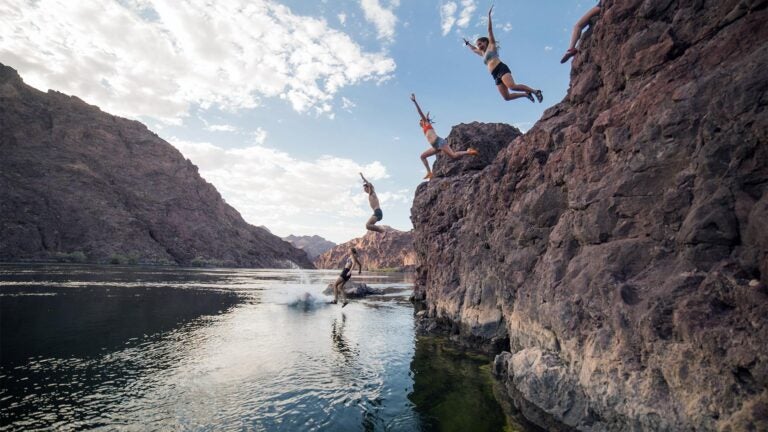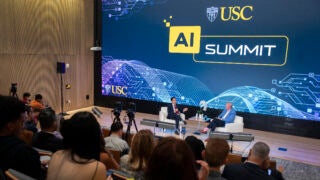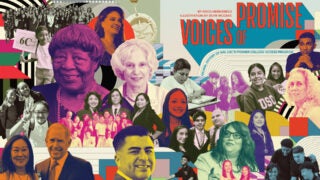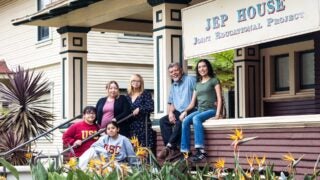
Student leaders with Peaks and Professors leap from a cliff in September 2019 during a canoe trip along the Colorado River. (Photo/Benjamin Banet)
How campus clubs found fun and friendship during a year apart
USC’s student clubs find innovative ways to explore the wilderness, practice sign language, work out together and much more during the pandemic.
Leo Driessen misses the laughs.
The USC senior used to meet friends from the comedy improv troupe Commedus Interruptus to hold free shows on the grass near Tommy Trojan every Friday afternoon. For the past year, though, coronavirus safety measures forced him to record his sketches on video and practice improv with his roommates instead.
“It’s weird posting to social media, because you don’t know what jokes worked, if any,” he said. “It’s a different metric — likes and views — than hearing those laughs. As performers, we all miss that interaction with the audience.”
The comedy crew is one of USC’s many recognized student organizations profoundly affected by the COVID-19 pandemic. Hundreds of clubs had to find new, innovative ways to pursue their passions at a distance.
Zoom and other online platforms became critical tools to stay connected. A weightlifting club started recording home workouts that require minimal equipment. A hiking group held online sessions to share tips for outdoors activities and put together camping kits so students could go on solo adventures.
“Everyone has had to adapt what they’re doing, and we’re no exception,” said Driessen, co-director of the comedy club and a communication major at the USC Annenberg School for Communication and Journalism. “It’s been important to keep everyone motivated, remind each other about what we love to do and keep that practice up.”
An outdoors club gives USC students new tools to explore nature
Peaks and Professors is all about enjoying nature together. The club brings USC students and faculty members together in the great outdoors. Adventures range from day hikes to overnight camping trips. When the pandemic ruled out those in-person treks, the club’s leaders shifted gears quickly.
“Although Peaks cannot currently have trips due to COVID, it’s our mission to make sure students can still enjoy the outdoors in a safe way,” said club President Colleen Corrigan, who majors in human biology and nongovernmental organizations and social change at the USC Dornsife College of Letters, Arts and Sciences.
It’s our mission to make sure students can still enjoy the outdoors in a safe way.
Colleen Corrigan
The group launched a series of online events to offer backpacking and camping advice, like how to pack “ultralight” for a solo trek. Peaks and Professors leaders also applied for a grant from the USC Well-Being Collective to create camping kits for USC students without gear.
“These kits can be borrowed for up to two weeks, and we will assist students in planning the logistics of their trip,” Corrigan said. “Each kit comes with a tent, two sleeping bags, two sleeping pads, a headlamp and a camping stove.”
The kits are available to students who can pick them up from campus, and the club launched a fundraiser that could enable them to ship the gear to students outside Southern California. The materials are thoroughly cleaned and disinfected after each use.
The outdoors group has also hosted a book club, speed dating and game nights to ensure members stay connected during the pandemic. Other pursuits included registering as an official nonprofit and establishing chapters at universities around the country, like UCLA, Stanford University and University of Michigan.
“Our social media is as active as ever, highlighting other cool outdoors accounts, sharing old trip photos and reflecting on all the incredible places we’ve explored,” Corrigan said. “I think it’s safe to say we have been staying busy.”
Sign language club moves online without getting lost in translation
Learning a new language seems like it should translate well to an online platform. But what if you’re studying sign language?
Deciphering and practicing hand movements is definitely trickier through streaming video than in person, said Andrew Chang, president of the American Sign Language Club and a business administration major at the USC Marshall School of Business.
Teaching American sign language, or ASL, is better in person because it’s easier to share intricacies and culture that way, he said.
“But of course, we’ve all had to evolve and deal with this barrier,” he said. “Thankfully, ASL is still very accessible through Zoom. You can see my hands and what I’m doing. It does require a bit more scrutiny and adds some difficulty because now everyone is scattered across the world instead of in one location.”
Despite the challenge of explaining subtle gestures over a video call, Chang said he has seen some major benefits to the club’s forced adaptation to an online environment. Now the group records its training sessions, allowing members to access those recordings whenever they want to brush up on their skills or revisit material.
“I definitely do see a better retention rate with people remembering what they learned,” he said. “The people who come really want to learn and will go back and review videos.”
It also ensures access for students in different time zones. One member tried attending meetings at 3 a.m., but she eventually settled on watching the recordings at her convenience. During their online meetings — held every other week — students gather for a lesson, then move into breakout rooms to practice vocabulary in small groups.
“We’re all tired after long days of Zoom and there are a lot of barriers in front of us,” Chang said. “But we are pushing forward against the pandemic and doing our best.”
To help its members stay in shape, USC exercise club goes virtual
When the pandemic swept across the world last spring, it left many USC students without their usual source of physical wellness and stress relief: the gym.
Justin Abe made sure they had other options to stay in shape. As the president of Trojan Steel, a USC club that encourages students to practice healthy and safe exercise habits, he devised workout strategies that could be shared online.
He knew many members didn’t have the wide array of workout equipment they’d normally use at the Lyon Center or other gyms, so he adjusted the club’s options.
Although working out has certainly become more difficult, we believe personal fitness is still as important as ever.
Justin Abe
“We shifted our focus to promoting at-home, no-equipment workouts, which are available either through videos on our website or through our free weekly workout subscription,” said Abe, a human biology major at USC Dornsife. “We also have continued to try to establish camaraderie through fitness by starting an online accountability program and continuing our volunteer trainer-trainee program online.”
All programs and workout videos are free to members, he added. Interested students can sign up for weekly workouts, email the group for more information and check out the club’s Instagram page for the latest updates.
“Although working out has certainly become more difficult, we believe personal fitness is still as important as ever,” Abe said.
(Story continues below)
The laughs continue online for USC improv comedy club
For Driessen, the improv and sketch comedian, the upheaval of COVID-19 offered an opportunity to bring Commedus Interruptus into the digital age. The group built out its previously nonexistent online presence with a website and social media accounts.
Now the club can share its sketch videos and maintain connections with its fans until they can gather for in-person shows again.
“We were so bad about filming videos,” Driessen said. “In a weird way, the comedy we’re doing now is going to outlast a lot of stuff we were doing before. It’s more visible, too. It’s a 180 from last year.”
The group’s members also meet regularly on Zoom to pitch and write sketches together. Although it’s not quite the same as getting an audience to break down in hysterical laughter, Driessen said it’s a good substitute, for now.
“In this group, we’re all comedy nerds who live and breathe comedy,” he said. “It gives us a guaranteed time to see each other and guaranteed laughs.”



